Unit 1 How can we become good learners Section A(1a-2d) 原创教学课件(共53张PPT)
文档属性
| 名称 | Unit 1 How can we become good learners Section A(1a-2d) 原创教学课件(共53张PPT) | 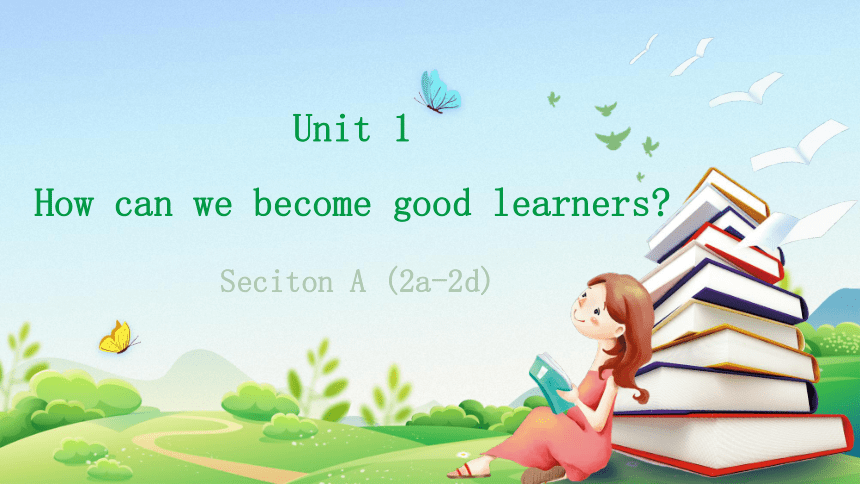 | |
| 格式 | pptx | ||
| 文件大小 | 79.3MB | ||
| 资源类型 | 试卷 | ||
| 版本资源 | 人教新目标(Go for it)版 | ||
| 科目 | 英语 | ||
| 更新时间 | 2022-10-18 22:16:57 | ||
图片预览

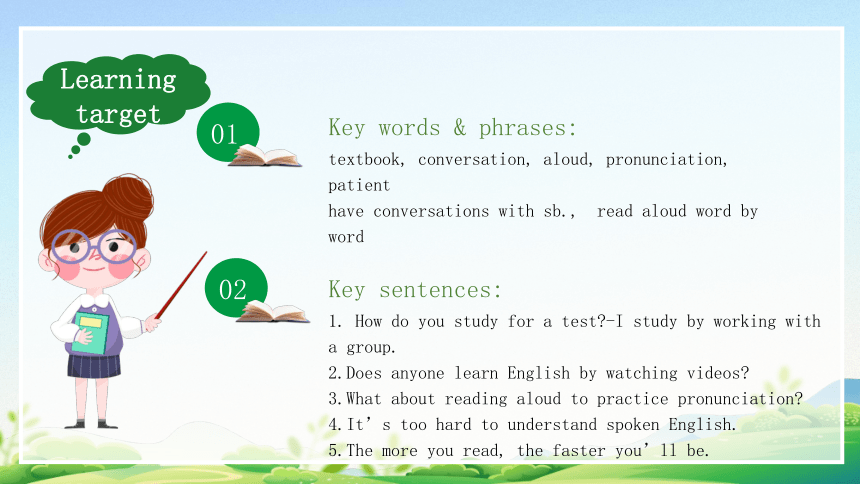

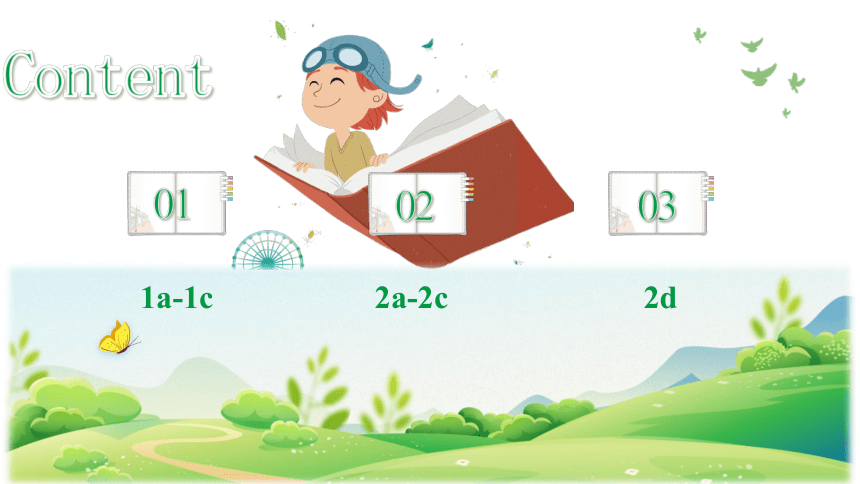
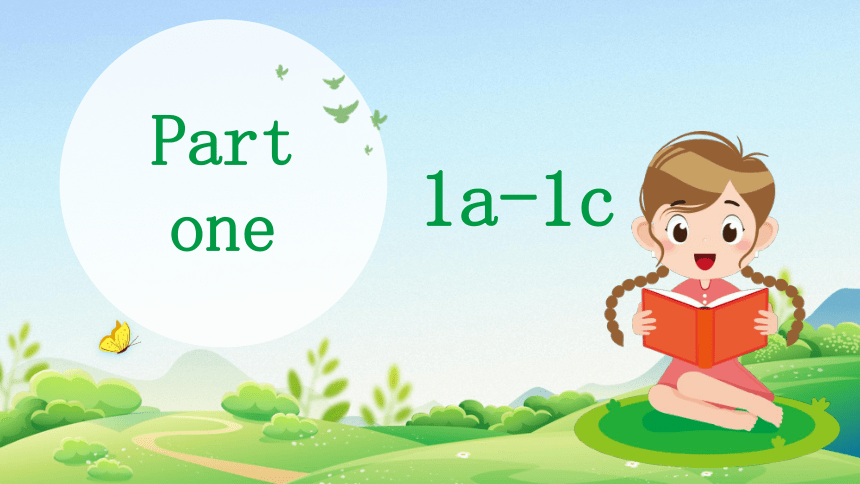
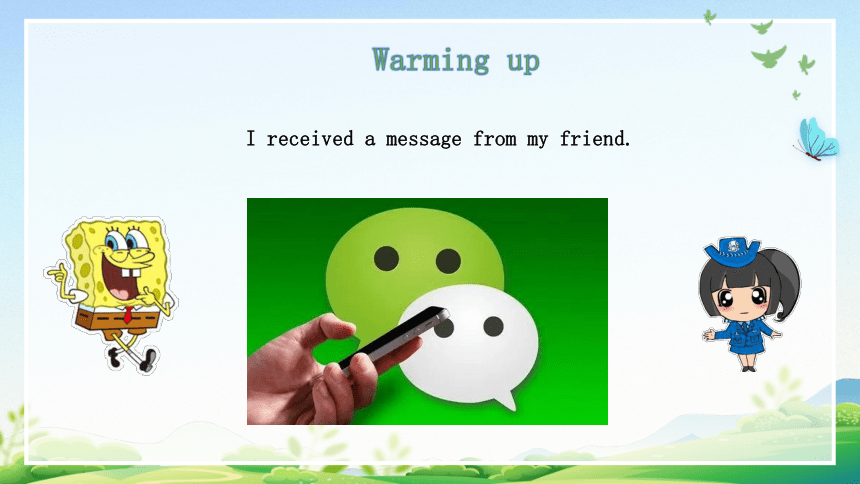
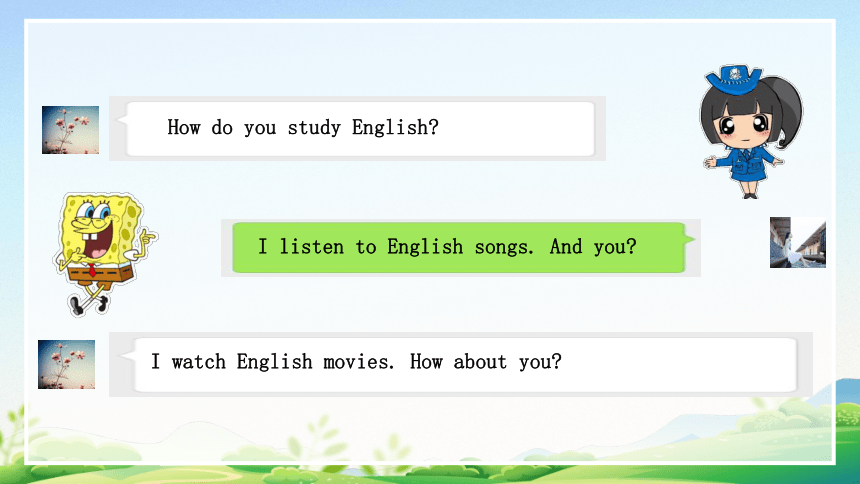
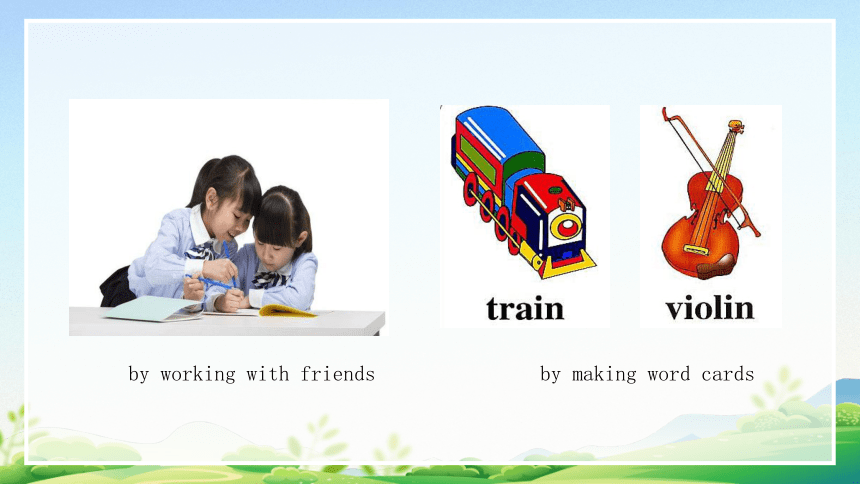
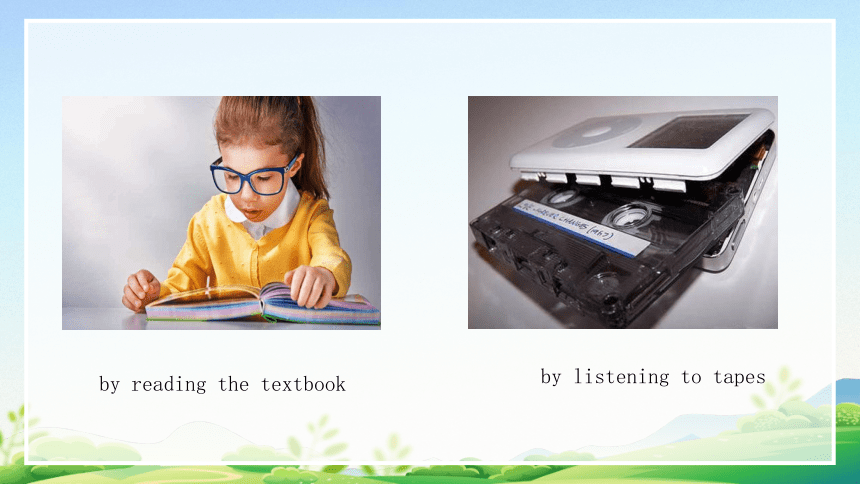
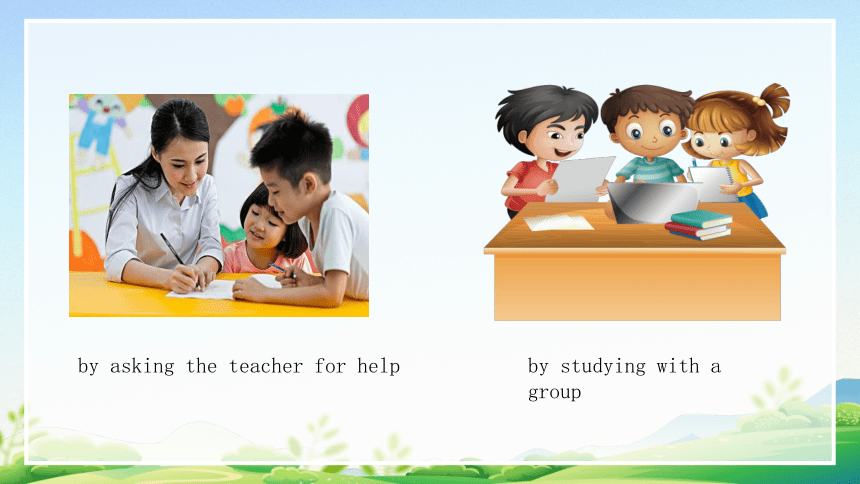
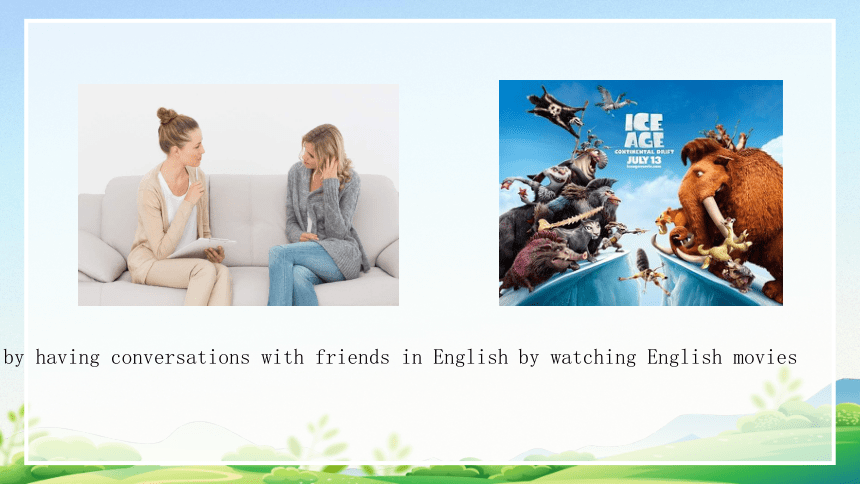
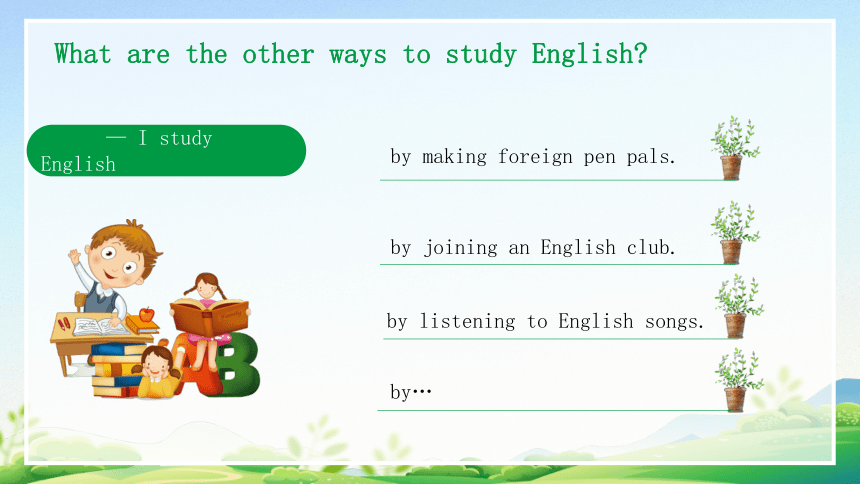
文档简介
(共53张PPT)
Unit 1
How can we become good learners
Seciton A (2a-2d)
Key words & phrases:
textbook, conversation, aloud, pronunciation, patient
have conversations with sb., read aloud word by word
Learning target
02
Key sentences:
1. How do you study for a test -I study by working with a group.
2.Does anyone learn English by watching videos
3.What about reading aloud to practice pronunciation
4.It’s too hard to understand spoken English.
5.The more you read, the faster you’ll be.
01
Content
1a-1c
01
2a-2c
02
2d
03
Part one
1a-1c
Warming up
I received a message from my friend.
How do you study English
I watch English movies. How about you
I listen to English songs. And you
by working with friends
by making word cards
by reading the textbook
by listening to tapes
by asking the teacher for help
by studying with a group
by having conversations with friends in English
by watching English movies
— I study English
What are the other ways to study English
by making foreign pen pals.
by joining an English club.
by listening to English songs.
by…
_____a. by working with friends
_____b. by making word cards
_____ c. by reading the textbook
_____ d. by listening to tapes
_____ e. by asking the teacher for help
______________________________
______________________________
1a
Check ( ) the ways you study English. Then add other ways you sometimes study.
√
n. 教科书;课本
√
by taking notes
√
√
by making a foreign pen pal
Listen. How do these students study for a test Write letters from 1a above.
1b
____
1. Meiping
____
2. Peter
____
3. Tony
b
e
d
I study by making
word cards.
Listening
material
Boy: Hey, everybody.There's a bigtest on Tuesday.I
really need some help. Can you tell me how you
study for a big test
Voices: Sure Yes.Sure we will.
Boy: You did really well on the last English test,didn't
you, Meiping
Meiping: Yeah,I did OK.
Boy: Well,how did you study for it
Meiping: By making word cards.
Boy:Maybe I'll try that.So,how do you study for a test,Peter
Peter:By asking the teacher for help. She's always happy to answer my questions.
Boy:That's interesting.How do you study,Tony
Tony:I like to study by listening to tapes. But sometimes my mother thinks I’m
listening to music.And then she gets mad.
Boy:Oh,maybe I won't do that then.
Watch a video
1c
Make conversations about how you study for a test.
A: How do you study for a test
B: I study by working with a group.
How do you study for a test
I study by working with a group.
Pair work
Part two
2a-2c
Listen and check ( ) the questions you hear.
2a
√
Questions
1. __ Do you learn English by watching videos
2. __ Do you have conversations with friend in English
3. __ What about listening to tapes
4. __ What about reading aloud to practice pronunciation
5. __ Have you ever studied with a group
√
√
√
√
n. 交谈;谈话
adv. 大声地;出声地
n. 发音;读音
Listen again. Match each answer below with a question
above.
2b
a. Yes, I have. I’ve learned a lot that way.
b. Oh, yes. It improves my speaking skills.
c. I do that sometimes. I think it helps.
d. No. It’s too hard to understand spoken English.
Listen again. Match each answer below with a question above.
1. ___ Does anyone learn English by watching videos
2. ___ Do you have conversations with friends in English
3. ___ What about listening to tapes
4. ___ What about reading aloud to practice
pronunciation
5. ___ Have you ever studied with a group
d
b
c
a
Listening
material
Man: Welcome to the English club. Today we’re going to talk about the best ways to learn English. Does anyone learn
English by watching videos
Girl 1: No. It’s too hard to understand spoken English.
Boy 1: What about keeping a diary in English Do you learn English that way
Girl 1: Yes, I do. It helps to write English
every day.
Boy 2: Have you ever studied with a group
Girl 2: Yes, I have! I’ve learned a lot that way.
Boy 2: Do you have conversations with friends in English
Girl 2: Oh, yes. It really improves my speaking skills.
Girl 1: What about reading aloud to practice pronunciation
Boy 1: I do that sometimes. I think it helps.
Girl 2: I do, too. And I often look up new words in
a dictionary.
Boy 2: That’s a great idea!
A: Have you ever studied with a group
B: Yes, I have. I’ve learned a lot that way.
2c
Make conversations using the information in 2a and 2b.
Part three
2d
2d
Role-play the conversation.
Jack: Annie, I’m a little nervous. I have to finish reading a book and give a
report next Monday.
Annie: That doesn’t sound too bad.
Jack: But I’m a very slow reader.
Annie: Just read quickly to get the main ideas at first. Don’t read word by
word, read word groups.
Jack: But I don’t understand many of the words. I have to use a dictionary.
Annie: Try to guess a word’s meaning by reading the sentences before and
after it. You probably understand more than you think.
Jack: That sounds difficult!
Annie: Well, be patient. It takes time. You can become better by reading
something you enjoy every day. The more you read, the faster you’ll be.
Watch a video
Language Points1
—How do you study for a test
你是怎样准备考试的
—I study by working with a group.
我通过和小组成员合作学习。
【句型剖析】
how引导特殊疑问句,常用来提问by引导的方式状语。
◎how 用来询问做事的方式或手段,意为“怎样,
如何”。
例:—How do you study for a test
你怎样为考试而学习?
—I study by working with friends.
我通过和朋友合作来学习。
how的用法小结
◎how用来询问身体健康状况, 意为“怎么样”。
◎how用来询问天气状况,意为“怎样”。
例:How is the weather in Beijing 北京的天气怎样?
相当于What’s the weather like in Beijing
How is your mother
She is very well.
◎how指数量的多少 ,后接其他形容词或副词,可以构成各
类疑问词组。
how many 多少; how long 多久; how often多久一次;
how old多大;how much多少(钱)等。
◎how作感叹词,意为“多么”。
How fine the weather is! = What fine weather it is!
天气多好啊!
中考链接
1. — ______ are the students in your class?
— Most of them are only fourteen.(湖北襄阳中考)
A. How long B. How old
C. How many D. How often
B
解析 how long多长时间,主要是对一段时间进行提问,答语通常是表示时间段的短语;how old多大,一般针对年龄提问;how many多少,其后跟可数名词复数;how often多久一次,其回答一般是表频率的短语。根据答语“Most of them are only fourteen”可知问句应该是问“多大年龄”,用How old。
2. —Hey, Jane. _____ are you feeling now?
—Much better. Thanks. (湖北黄石中考)
A. What B. Where C. How D. When
3. —People choose high-speed train or self-driving
to travel on holidays.
—_____ fast the traditional travel ways change!
(2017·湖北宜昌)
A. What a B. How C. What D. How a
解析 本句是一个感叹句,此处感叹副词fast,所以只能用how。what(a)用于感叹名词。
C
B
Language Points 2
by表示“通过……方法、手段”等。
by doing sth. 意为“通过……(方法、途径)做某事”
by是个很常用的介词(有时也用作副词),在初中英语中的其他用法有以下几种:
(1) 意为“在……旁”、“靠近”。如:
They are drawing by the lake. 他们在湖边画画。
(2) 意为“不迟于”、“到……时为止”
He will be all right by supper time. 他在晚饭前会好的。
(3) 表示方法、手段,可译作“靠”、“用” 、“凭借”等。
The monkey was hanging from the tree by his tail.
猴子用尾巴吊在树上。
(4) 用于被动句中,表示行为主体,常译 作“被”、“由”等。
English is spoken by many people. 许多人讲英语。
(5) 组成其它短语:
by the way :意为“顺便说”、“顺便问一 下”, 常作插入语。
eg: By the way, where’s Lily 顺便问一下,李丽在哪儿?
by oneself :意为“单独”、“自己”。
eg: I can’t leave her by herself. 我不能把她单独留下。
by and by :意为“不久以后”、“不一会儿”。
eg: By and by, more and more people began to study English.
不久以后,越来越多的人开始学英语了。
(1)What about… 相当于How about…?它是一种固定用法。What about…?常用来表示征求对方意见或向对方提出建议,about为介词,其后接名词、代词、动词-ing形式作宾语。
What about reading aloud to practice pronunciation
大声朗读来练习发音怎么样?
扩展
Why don’t you do sth. =Why not do sth. 你为什么不做某事呢?
Let’s do sth.咱们做某事吧。
You’d better (not) do sth.你最好(不要)做某事。
You should (not) do sth.你应该(不)做某事。
Language Points 3
(2)aloud adv. 大声地; 出声地
辨析:aloud,loudly与loud
aloud adv. 大声地;出声地,常与call, shout, cry, read 等连用。 Please read the passage aloud. 请大声读短文。
loudly adv. 喧闹地、大声地,常与knock, ring 连用。loudly 往往含有令人讨厌或打扰别人的意思,可位于动词之前或之后。 Suddenly the bell on the
wall rang loudly. 墙上的
铃突然大声地响了起来。
(2)aloud adv. 大声地; 出声地
辨析:aloud,loudly与loud
loud ①用作副词,几乎总是用于 loud enough, as loud as 等短语中或与too, very, so 连用。 Don’t play the tape so loud.
播放磁带声音别那么大。
②可作形容词,用于固定搭配:in a loud voice 大声地 Our teacher always speaks in a loud voice.
我们老师总是说话声音很大。
e.g. The word has two pronunciations. 这个单词有两个发音。
My brother is practicing his pronunciation.
我的弟弟正在练习发音。
The pronunciation of the word is really strange.
这个单词的发音真奇怪。
Who can tell me how to pronounce the word
谁能告诉我这个单词怎么发音?
(3)pronunciation n. 发音;读音
可数名词, 表示单词发音个数
不可数名词, 表示发音方法或能力
……的发音
pronunciation 的动词形式。
(4)It's too hard to understand spoken English.
听懂英语口语太难了。
该句的句型为“It's+adj.+(for sb.)+to do sth.”。
too…to…在此句中不是表示“太……而不能……”,而是表示肯定意义。
it在句中是形式主语,真正的主语是后面的动词不定式to understand spoken English。
—It's difficult for me _____ the homework in such a short time.
—Come on! I'm sure you can.(四川广安中考)
A. finished B. to finish C. will finish D. finishes
中考链接
B
eg:Don't read the report word by word. Just skim it.
逐字读报告,大致地看一下就可以了。
拓展: 类似用法的短语还有
day by day 逐日;一天天地
year by year 逐年;一年一年地
little by little 逐渐地;渐渐地
one by one 一个接一个地
step by step 逐步地;循序渐进地
side by side 肩并肩地; 一起
Don’t read word by word.不要一字一字地读。
Language Points 4
意思
patient adj. 有耐心的 n. 病人
变换
① patience n . 耐心→in patience 耐心地
② patiently adv . 有耐心地
① be patient with sb. /sth. 对某人/ 某事有耐心;
② be patient to do sth. 有耐心做某事。
短语
Well, be patient.嗯,要有耐心。
Language Points 4
“The + 比较级…, the + 比较级”,意为“越……,就越……”
eg:The faster you run, the more difficult you'll feel.
你跑得越快,你就感觉越困难。
The more you read, the faster you'll be.
你读得越多,就将读得越快。
Language Points 4
一、单项选择。
1. — Do you know _____ she went to the movie last night
— On foot.
A. when B. why C. how
2. — How do you study for a test
— _____ working with friends.
A. By B. With C. On
3. I can't hear you. Please speak _____.
A. quickly B. aloud C. fast
C
A
B
Exercise
二、 用所给词的适当形式填空。
1.You should read ______(loud) to practice pronunciation.
2. She had a diet________(lose) weight.
3. It is too _______(heavily) for me ________ (carry) it.
4. Have you finished________(read) your story book
5. The _____(much) you eat, the ______(fat) you will be.
aloud
to lose
heavy
to carry
reading
more
fatter
01
02
03
Summary
1. Learned some learning ways.
Learned the use of “how”and “by”.
Learned some words and expressions.
Homework
Memorize the new words and phrases.
Write a conversation about “How to study English”.
Preview the passage in 3a.
Unit 1
How can we become good learners
Section A (3a-4c)
Next
Unit 1
How can we become good learners
Seciton A (2a-2d)
Key words & phrases:
textbook, conversation, aloud, pronunciation, patient
have conversations with sb., read aloud word by word
Learning target
02
Key sentences:
1. How do you study for a test -I study by working with a group.
2.Does anyone learn English by watching videos
3.What about reading aloud to practice pronunciation
4.It’s too hard to understand spoken English.
5.The more you read, the faster you’ll be.
01
Content
1a-1c
01
2a-2c
02
2d
03
Part one
1a-1c
Warming up
I received a message from my friend.
How do you study English
I watch English movies. How about you
I listen to English songs. And you
by working with friends
by making word cards
by reading the textbook
by listening to tapes
by asking the teacher for help
by studying with a group
by having conversations with friends in English
by watching English movies
— I study English
What are the other ways to study English
by making foreign pen pals.
by joining an English club.
by listening to English songs.
by…
_____a. by working with friends
_____b. by making word cards
_____ c. by reading the textbook
_____ d. by listening to tapes
_____ e. by asking the teacher for help
______________________________
______________________________
1a
Check ( ) the ways you study English. Then add other ways you sometimes study.
√
n. 教科书;课本
√
by taking notes
√
√
by making a foreign pen pal
Listen. How do these students study for a test Write letters from 1a above.
1b
____
1. Meiping
____
2. Peter
____
3. Tony
b
e
d
I study by making
word cards.
Listening
material
Boy: Hey, everybody.There's a bigtest on Tuesday.I
really need some help. Can you tell me how you
study for a big test
Voices: Sure Yes.Sure we will.
Boy: You did really well on the last English test,didn't
you, Meiping
Meiping: Yeah,I did OK.
Boy: Well,how did you study for it
Meiping: By making word cards.
Boy:Maybe I'll try that.So,how do you study for a test,Peter
Peter:By asking the teacher for help. She's always happy to answer my questions.
Boy:That's interesting.How do you study,Tony
Tony:I like to study by listening to tapes. But sometimes my mother thinks I’m
listening to music.And then she gets mad.
Boy:Oh,maybe I won't do that then.
Watch a video
1c
Make conversations about how you study for a test.
A: How do you study for a test
B: I study by working with a group.
How do you study for a test
I study by working with a group.
Pair work
Part two
2a-2c
Listen and check ( ) the questions you hear.
2a
√
Questions
1. __ Do you learn English by watching videos
2. __ Do you have conversations with friend in English
3. __ What about listening to tapes
4. __ What about reading aloud to practice pronunciation
5. __ Have you ever studied with a group
√
√
√
√
n. 交谈;谈话
adv. 大声地;出声地
n. 发音;读音
Listen again. Match each answer below with a question
above.
2b
a. Yes, I have. I’ve learned a lot that way.
b. Oh, yes. It improves my speaking skills.
c. I do that sometimes. I think it helps.
d. No. It’s too hard to understand spoken English.
Listen again. Match each answer below with a question above.
1. ___ Does anyone learn English by watching videos
2. ___ Do you have conversations with friends in English
3. ___ What about listening to tapes
4. ___ What about reading aloud to practice
pronunciation
5. ___ Have you ever studied with a group
d
b
c
a
Listening
material
Man: Welcome to the English club. Today we’re going to talk about the best ways to learn English. Does anyone learn
English by watching videos
Girl 1: No. It’s too hard to understand spoken English.
Boy 1: What about keeping a diary in English Do you learn English that way
Girl 1: Yes, I do. It helps to write English
every day.
Boy 2: Have you ever studied with a group
Girl 2: Yes, I have! I’ve learned a lot that way.
Boy 2: Do you have conversations with friends in English
Girl 2: Oh, yes. It really improves my speaking skills.
Girl 1: What about reading aloud to practice pronunciation
Boy 1: I do that sometimes. I think it helps.
Girl 2: I do, too. And I often look up new words in
a dictionary.
Boy 2: That’s a great idea!
A: Have you ever studied with a group
B: Yes, I have. I’ve learned a lot that way.
2c
Make conversations using the information in 2a and 2b.
Part three
2d
2d
Role-play the conversation.
Jack: Annie, I’m a little nervous. I have to finish reading a book and give a
report next Monday.
Annie: That doesn’t sound too bad.
Jack: But I’m a very slow reader.
Annie: Just read quickly to get the main ideas at first. Don’t read word by
word, read word groups.
Jack: But I don’t understand many of the words. I have to use a dictionary.
Annie: Try to guess a word’s meaning by reading the sentences before and
after it. You probably understand more than you think.
Jack: That sounds difficult!
Annie: Well, be patient. It takes time. You can become better by reading
something you enjoy every day. The more you read, the faster you’ll be.
Watch a video
Language Points1
—How do you study for a test
你是怎样准备考试的
—I study by working with a group.
我通过和小组成员合作学习。
【句型剖析】
how引导特殊疑问句,常用来提问by引导的方式状语。
◎how 用来询问做事的方式或手段,意为“怎样,
如何”。
例:—How do you study for a test
你怎样为考试而学习?
—I study by working with friends.
我通过和朋友合作来学习。
how的用法小结
◎how用来询问身体健康状况, 意为“怎么样”。
◎how用来询问天气状况,意为“怎样”。
例:How is the weather in Beijing 北京的天气怎样?
相当于What’s the weather like in Beijing
How is your mother
She is very well.
◎how指数量的多少 ,后接其他形容词或副词,可以构成各
类疑问词组。
how many 多少; how long 多久; how often多久一次;
how old多大;how much多少(钱)等。
◎how作感叹词,意为“多么”。
How fine the weather is! = What fine weather it is!
天气多好啊!
中考链接
1. — ______ are the students in your class?
— Most of them are only fourteen.(湖北襄阳中考)
A. How long B. How old
C. How many D. How often
B
解析 how long多长时间,主要是对一段时间进行提问,答语通常是表示时间段的短语;how old多大,一般针对年龄提问;how many多少,其后跟可数名词复数;how often多久一次,其回答一般是表频率的短语。根据答语“Most of them are only fourteen”可知问句应该是问“多大年龄”,用How old。
2. —Hey, Jane. _____ are you feeling now?
—Much better. Thanks. (湖北黄石中考)
A. What B. Where C. How D. When
3. —People choose high-speed train or self-driving
to travel on holidays.
—_____ fast the traditional travel ways change!
(2017·湖北宜昌)
A. What a B. How C. What D. How a
解析 本句是一个感叹句,此处感叹副词fast,所以只能用how。what(a)用于感叹名词。
C
B
Language Points 2
by表示“通过……方法、手段”等。
by doing sth. 意为“通过……(方法、途径)做某事”
by是个很常用的介词(有时也用作副词),在初中英语中的其他用法有以下几种:
(1) 意为“在……旁”、“靠近”。如:
They are drawing by the lake. 他们在湖边画画。
(2) 意为“不迟于”、“到……时为止”
He will be all right by supper time. 他在晚饭前会好的。
(3) 表示方法、手段,可译作“靠”、“用” 、“凭借”等。
The monkey was hanging from the tree by his tail.
猴子用尾巴吊在树上。
(4) 用于被动句中,表示行为主体,常译 作“被”、“由”等。
English is spoken by many people. 许多人讲英语。
(5) 组成其它短语:
by the way :意为“顺便说”、“顺便问一 下”, 常作插入语。
eg: By the way, where’s Lily 顺便问一下,李丽在哪儿?
by oneself :意为“单独”、“自己”。
eg: I can’t leave her by herself. 我不能把她单独留下。
by and by :意为“不久以后”、“不一会儿”。
eg: By and by, more and more people began to study English.
不久以后,越来越多的人开始学英语了。
(1)What about… 相当于How about…?它是一种固定用法。What about…?常用来表示征求对方意见或向对方提出建议,about为介词,其后接名词、代词、动词-ing形式作宾语。
What about reading aloud to practice pronunciation
大声朗读来练习发音怎么样?
扩展
Why don’t you do sth. =Why not do sth. 你为什么不做某事呢?
Let’s do sth.咱们做某事吧。
You’d better (not) do sth.你最好(不要)做某事。
You should (not) do sth.你应该(不)做某事。
Language Points 3
(2)aloud adv. 大声地; 出声地
辨析:aloud,loudly与loud
aloud adv. 大声地;出声地,常与call, shout, cry, read 等连用。 Please read the passage aloud. 请大声读短文。
loudly adv. 喧闹地、大声地,常与knock, ring 连用。loudly 往往含有令人讨厌或打扰别人的意思,可位于动词之前或之后。 Suddenly the bell on the
wall rang loudly. 墙上的
铃突然大声地响了起来。
(2)aloud adv. 大声地; 出声地
辨析:aloud,loudly与loud
loud ①用作副词,几乎总是用于 loud enough, as loud as 等短语中或与too, very, so 连用。 Don’t play the tape so loud.
播放磁带声音别那么大。
②可作形容词,用于固定搭配:in a loud voice 大声地 Our teacher always speaks in a loud voice.
我们老师总是说话声音很大。
e.g. The word has two pronunciations. 这个单词有两个发音。
My brother is practicing his pronunciation.
我的弟弟正在练习发音。
The pronunciation of the word is really strange.
这个单词的发音真奇怪。
Who can tell me how to pronounce the word
谁能告诉我这个单词怎么发音?
(3)pronunciation n. 发音;读音
可数名词, 表示单词发音个数
不可数名词, 表示发音方法或能力
……的发音
pronunciation 的动词形式。
(4)It's too hard to understand spoken English.
听懂英语口语太难了。
该句的句型为“It's+adj.+(for sb.)+to do sth.”。
too…to…在此句中不是表示“太……而不能……”,而是表示肯定意义。
it在句中是形式主语,真正的主语是后面的动词不定式to understand spoken English。
—It's difficult for me _____ the homework in such a short time.
—Come on! I'm sure you can.(四川广安中考)
A. finished B. to finish C. will finish D. finishes
中考链接
B
eg:Don't read the report word by word. Just skim it.
逐字读报告,大致地看一下就可以了。
拓展: 类似用法的短语还有
day by day 逐日;一天天地
year by year 逐年;一年一年地
little by little 逐渐地;渐渐地
one by one 一个接一个地
step by step 逐步地;循序渐进地
side by side 肩并肩地; 一起
Don’t read word by word.不要一字一字地读。
Language Points 4
意思
patient adj. 有耐心的 n. 病人
变换
① patience n . 耐心→in patience 耐心地
② patiently adv . 有耐心地
① be patient with sb. /sth. 对某人/ 某事有耐心;
② be patient to do sth. 有耐心做某事。
短语
Well, be patient.嗯,要有耐心。
Language Points 4
“The + 比较级…, the + 比较级”,意为“越……,就越……”
eg:The faster you run, the more difficult you'll feel.
你跑得越快,你就感觉越困难。
The more you read, the faster you'll be.
你读得越多,就将读得越快。
Language Points 4
一、单项选择。
1. — Do you know _____ she went to the movie last night
— On foot.
A. when B. why C. how
2. — How do you study for a test
— _____ working with friends.
A. By B. With C. On
3. I can't hear you. Please speak _____.
A. quickly B. aloud C. fast
C
A
B
Exercise
二、 用所给词的适当形式填空。
1.You should read ______(loud) to practice pronunciation.
2. She had a diet________(lose) weight.
3. It is too _______(heavily) for me ________ (carry) it.
4. Have you finished________(read) your story book
5. The _____(much) you eat, the ______(fat) you will be.
aloud
to lose
heavy
to carry
reading
more
fatter
01
02
03
Summary
1. Learned some learning ways.
Learned the use of “how”and “by”.
Learned some words and expressions.
Homework
Memorize the new words and phrases.
Write a conversation about “How to study English”.
Preview the passage in 3a.
Unit 1
How can we become good learners
Section A (3a-4c)
Next
同课章节目录
- Unit 1 How can we become good learners.
- Section A
- Section B
- Unit 2 I think that mooncakes are delicious!
- Section A
- Section B
- Unit 3 Could you please tell me where the restroom
- Section A
- Section B
- Unit 4 I used to be afraid of the dark.
- Section A
- Section B
- Unit 5 What are the shirts made of?
- Section A
- Section B
- Review of Units 1-5
- Unit 6 When was it invented?
- Section A
- Section B
- Unit 7 Teenagers should be allowed to choose their
- Section A
- Section B
- Unit 8 It must belong to Carla.
- Section A
- Section B
- Unit 9 I like music that I can dance to.
- Section A
- Section B
- Unit 10 You're supposed to shake hands.
- Section A
- Section B
- Review of Units 6-10
- Unit 11 Sad movies make me cry.
- Section A
- Section B
- Unit 12 Life is full of the unexpected
- Section A
- Section B
- Unit 13 We're trying to save the earth!
- Section A
- Section B
- Unit 14 I remember meeting all of you in Grade 7.
- Section A
- Section B
- Review of Units 11-14
